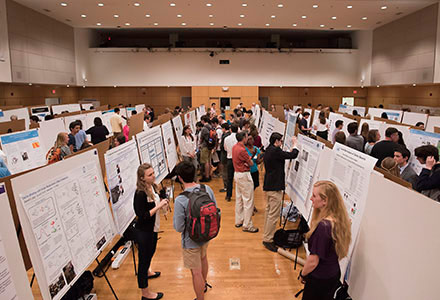Research - On Display

A physics and astronomy student, Matthew Chancey knows well what his departmental classmates are working on and the research results they’re yielding.
Research in other departments, however, is a different story. There’s just too much for the senior to track.
But on April 18, the Student Union’s Great Hall provided a visual representation of the large scale of research conducted every day in Carolina’s labs and classrooms.
“It’s nice to come out and see all of the other research that’s being done at Chapel Hill,” Chancey said. “You get to learn a lot.”
The research conducted by more than 200 University of North Carolina at Chapel Hill undergraduates was on full display for the 17th annual Celebration of Undergraduate Research in the Student Union. Throughout the three-hour event, research that students completed independently or with faculty and graduate students was showcased with poster presentations and panel discussions.
Hosted by the Office of Undergraduate Research, the celebration consisted of two poster sessions during which more than 150 students exhibited their findings to spectators roaming throughout the Great Hall. Dozens of other students opted to conduct 10-minute discussions during panel sessions moderated by faculty members.
Departments from all across campus were represented at the symposium. Research topics included health and well being; diversity and equity; environment; fine arts; education; and United States and foreign relations.
“They don’t have to be a specific major, they don’t have to take a specific class, they don’t have to be working with a specific person or in a lab,” said Yesina Merino, the Office for Undergraduate Research’s outreach coordinator. “Many of the students who are presenting the research have done independent research. They’ll ask their own questions, collect their own data, analyze their results and they’ll present their information. It’s all student generated.”
Katie Yelton was among that group of students who conducted their own independent research. As part of a Summer Undergraduate Research Fellowship from the Office of Undergraduate Research, the American Studies student spend last summer interviewing women in textile mills in Rutherford County, North Carolina
Yelton then curated the interviews, showing the history and culture of the female workers.
“I’ve been inspired by her story,” she said. “I wanted to tell her story and the stories of women like her. I wanted to give them a platform for their experiences to be heard and appreciated it.”
Among the hundreds of spectators inside the Great Hall was Katie’s father David, who drove 200 miles from Rutherfordton to see his daughter present. A history professor at Gardner-Webb University, David Yelton said he was impressed by the students’ work.
“It’s a good indication that students can actually work independently and apply the things they learned in the classroom situations and produce their own work,” he said. “I think it’s an impressive thing to see so many young folks who are doing that.”
Not only did the celebration provide an opportunity for students to show their work, it gave them a chance to hone their presentation skills.
“I think that if you’re going to go into the academic field, its vital to get experience presenting,” said Chancey, who was presenting his work on fission fragment damage.
The event highlighted Carolina’s commitment to becoming the leading global public research university, said College of Arts and Sciences Dean Kevin Guskiewicz.
“At some universities it is very unusual to have undergraduate students working alongside faculty and graduate students in research laboratories,” he said. “At Carolina, that is not the case. This is a place that truly understands and values the opportunities that our undergraduate students should have and deserve to have.”
It will be the young researchers today, he said, who will play integral roles in the future of their fields.
“I’d bet that some of those future leaders, original thinkers, those dynamic doers who are going to help us solve those grand challenges and identify the next grand challenges are sitting in this room today,” he said.
To learn more about the research presentations, click here.
Story by Brandon Bieltz and photos by Jon Gardiner, Office of Communications and Public Affairs
Article originally posted at UNC Spotlights.
- Created on .